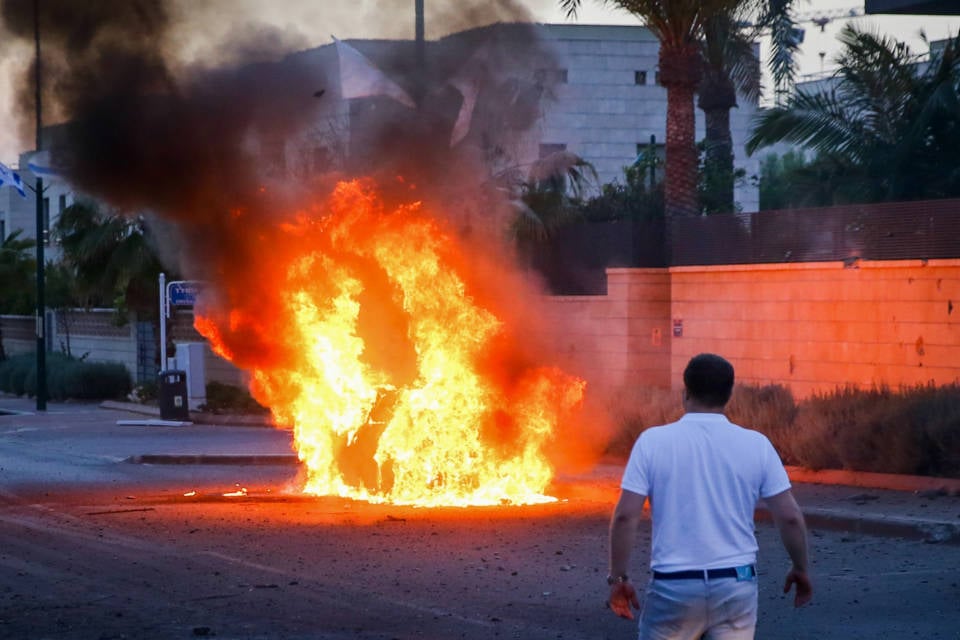Your cart is currently empty!

Ensuring Security in Post-War Gaza: Strategies for Israel

Ensuring Security in Post-War Gaza: Strategies for Israel

Israel must ensure a strategic reevaluation and restructuring of governance and security in the Gaza Strip.
By Israel Kasnett, JNS
Israel’s calculated and legitimate response to Hamas’s Oct. 7 massacre and years of rocket fire on Israel’s civilian population is advancing systematically, leading many to anticipate the eventual dismantling of the terror group and its leadership. However, divergent views have emerged regarding the future governance of Gaza.
A paramount objective is mitigating the security challenges confronting Israel. Post-conflict, Israel’s military and security apparatus will maintain a concerted effort to systematically destroy Hamas’s presence within Gaza, targeting terrorists and dismantling both its military and administrative infrastructures. Simultaneously, a structured, phased strategy will be imperative to institute effective civil governance mechanisms in the coastal enclave.
One proposal for post-Hamas Gaza has come from Israeli Knesset member and former Israeli Ambassador to the United Nations Danny Danon. His plan came in response to pressure from the Biden administration, which has recently been demanding that the close of this war result in two states for two peoples, with Gaza being governed by the Palestinian Authority.
Danon’s proposal rejects the P.A. as the ruling party. Instead, he foresees the best governing solution as the establishment of an international framework that will consist of the region’s countries and the broader international community.
In his plan, Danon lists five core steps for Gaza after the war. These comprise complete demilitarization of the Gaza Strip; the establishment of a defensive security buffer zone along the border with Israel; an upgrade of the Rafah crossing on the Gazan side, which he envisions as being overseen by a combination of Israeli and international forces; the enabling of voluntary emigration for Gazans who wish to relocate; and finally, economic rehabilitation within Gaza on the premise of the renunciation of incitement and terror.
Danon explained: “My five-point plan will provide a solution that will ensure the security of Israel’s residents in the southern communities and will also allow the Gazans to build a normal life free from the trappings of hate and terror. Given the devastation and trauma [inflicted on Israel by] Oct. 7…we cannot abide…a solution that involves Gaza being ruled by any authority that supports and promotes terror. We will never risk the lives of our citizens in this way.”
Danon told JNS that in Gaza, Israel will retain the freedom “to act against any terror threat, as we do in Judea and Samaria.”
Israel will not count on the international community to fight terrorism, “but we are counting on them to deal with the civilian issue and rebuild society in Gaza,” he added.
In a similar vein, former National Security Adviser Yaakov Amidror said on a JINSA conference call on Thursday that Israel will require a buffer zone on the Gaza side of the fence and will also need to maintain freedom of action as it has in the West Bank and Syria to prevent and eliminate threats to the Jewish state.
There are several stages of operation that Israel is considering. Initially and of immediate concern is killing or capturing all Hamas and Palestinian Islamic Jihad terrorists and destroying all terror infrastructure. At the same time, Israel is working with the Biden administration to ensure the transfer of aid to the Palestinian population.
Dr. Kobi Michael, a senior researcher at the Institute for National Security Studies, and Col. (res.) Prof. Gabi Siboni, an expert on cyber security, military strategy, and technology at the Jerusalem Institute for Strategy and Security, noted that at a later stage, “Complex needs will need to be addressed, such as education, employment, advanced health services, environment, communications, and infrastructure, among other needs.”
The question of who will be addressing these needs has yet to be solved. Israel has expressed disinterest in taking on this responsibility and instead would like to see the Abraham Accords group of nations, together with the United States, Egypt, and Saudi Arabia, adopt the role of rebuilding Gaza and rehabilitating its residents while ensuring the end of all incitement against Israel.
Israel also needs to prepare for the political chaos that will take place in Gaza after the transition period from high-intensity to low-intensity conflict, after achieving full operational freedom there.
As part of Israel’s complete breakaway from Gaza, Michael and Siboni suggested that Israel’s coordination and liaison administration, the Coordination of Government Activities in the Territories (COGAT), “be dismantled to ensure complete Israeli civilian disengagement from the Gaza Strip. A similar process should be examined in Judea and Samaria to create an alternative organizational structure to the P.A.”
Israeli Prime Minister Benjamin Netanyahu opposes the P.A. being given influence in Gaza, citing its historical failures, corruption, and anti-Israeli sentiments. The P.A. is known for inciting violence, supporting terrorism, and lacking legitimacy.
According to Michael and Siboni, “Three decades of P.A. rule have shown it to be—through most of that time—a failed, corrupt and illegitimate entity, devoid of domestic legitimacy. The P.A. has also become a major instrument in building a Palestinian consensus that denies the right of the Jewish people to self-determination. The P.A. has systematically incited against Israel and the Jews and delegitimized Israel.”
They also noted that to date, no P.A. official has condemned the atrocities committed by Hamas on Oct. 7. “In addition, many schools under the P.A.’s jurisdiction glorify the massacre. It is clear that after the war it will be necessary to reexamine the situation in Judea and Samaria as well,” they said.
“There’s a need to revise the educational curriculum in Palestinian territories to eliminate content that incites violence against Israel,” they added.
Similarly, Israel’s National Security Council Director Tzachi Hanegbi said in a Saudi editorial published last week that Israel seeks a “reformed” P.A., and focused on the need to denazify the next generation growing up in Gaza and Judea and Samaria.
Michael and Siboni also called for an end to the P.A.’s “pay-for-slay” policy of paying salaries and allowances to terrorists detained and imprisoned in Israel, or to the families of terrorists.
According to Michael and Siboni, one of the most important demands Israel must now make of any new Palestinian leadership is that Palestinians must drop “the two foundational pillars of the Palestinian ethos: the ‘right of return’ and the ‘armed struggle.’ To this end, all mechanisms for perpetuating Palestinian refugeehood—the refugee camps and UNRWA—must be dismantled.”
Overall, Michael and Siboni’s message is that Israel must ensure a strategic reevaluation and restructuring of governance and security in the Gaza Strip and the wider Palestinian territories, with a focus on regional collaboration.
As part of its plan to eradicate terrorism in the Gaza Strip, Israel will need to maintain security control, including over the Philadelphi corridor, which it left in 2005 due to pressure from then-U.S. Secretary of State Condoleeza Rice. This was a costly mistake that led to the massive militarization of Gaza, allowed Hamas to fire approximately 100,000 rockets at Israel, and led to the massive stockpiling of weaponry the IDF sees today in Gaza’s homes, hospitals, mosques, schools and tunnels.
Dan Diker, president of the Jerusalem Center for Public Affairs, told JNS that Israel and Egypt “will need to share national security responsibilities, each on its side of the border.”
He noted that Israel, “like in areas A and B of the areas under nominal P.A. control in Judea and Samaria, will always maintain the right to pursue terrorists” in post-war Gaza.
“It remains unclear who and how internal policing will be handled in Gaza, but it is reasonable to assess that local police forces will secure their local districts,” he said. “What is an essential pre-condition to future security for both Gazans and Israel is that the IDF destroys Hamas militarily and politically with an overwhelming victory,” he said.
“The Arab world as well as the Iranian regime and its terror proxies are watching carefully,” he warned.
However, David Weinberg, a senior fellow at Misgav: The Institute for National Security & Zionist Strategy, and Israel’s Defense and Security Forum, told JNS that post-Hamas Gaza “is mostly the world’s problem, not Israel’s, because the resolution is tied to broader regional battles.”
“Israel is done with coddling Gaza,” said Weinberg. “Relief and rehabilitation for Gazan Palestinians is now the world’s problem, not Israel’s.”
Weinberg suggested that Israel is “exempt from answering this question—certainly now when it must laser-focus only on outright military victory. The demand that Israel answer this question now is pointedly meant to prevent Israel from doing what needs to be done in Gaza, so it must be rebuffed.”
Weinberg agreed with other experts that Israel will need to create “a new security buffer zone inside Gaza and along its entire perimeter (maybe including the Philadelphi corridor on the border with Egypt) which Israel will control indefinitely.”
Israel at War with Hamas. Support Israel Today!
The people of Israel need your help at this most critical time. Please make a donation to help protect and defend Israelis against unprecedented Hamas terror.
Rockets are falling. Sirens blare, with seconds to run for cover. IDF soldiers risk their lives battling terrorists inside Gaza. Thousands forced to abandon their homes in southern Israel.
To fight terror and save lives, UWI provides bomb shelters, anti-terror vehicles, protective gear, security equipment, medical assistance, relief to victims and much more.
Help Israel fight and win this war against Hamas. The time to act is now!
The post Ensuring Security in Post-War Gaza: Strategies for Israel first appeared on United with Israel.
United with Israel
